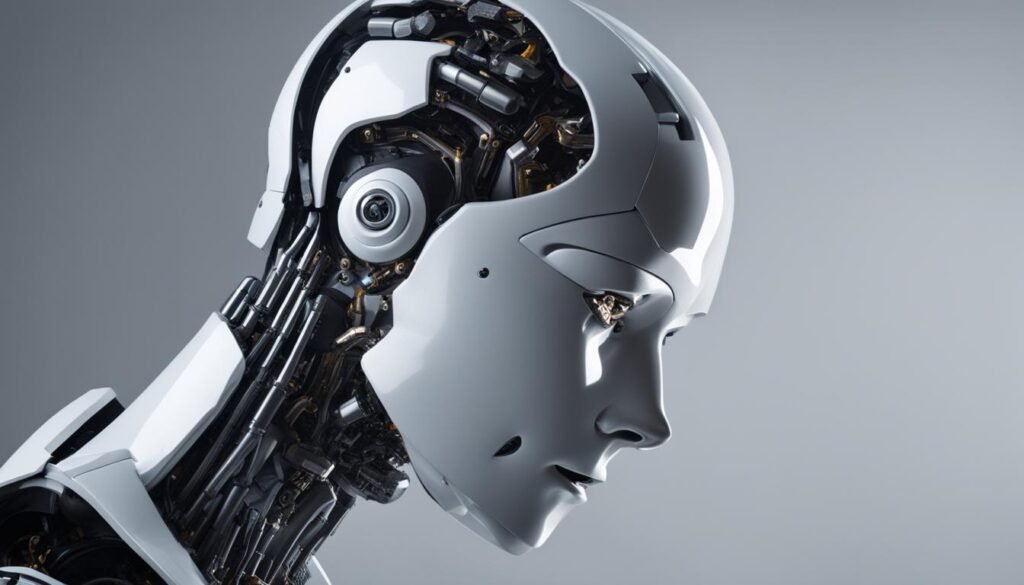
Understanding the Cons of Artificial Intelligence – A Closer Look

Artificial intelligence (AI) has undoubtedly revolutionized various industries and brought about many benefits. However, it is essential to also consider the potential drawbacks and negative effects of AI. In this section, I will explore the cons of artificial intelligence and delve into its implications for our future society.
Key Takeaways
- AI carries risks and limitations that need to be addressed.
- Potential job loss and socioeconomic challenges are among the significant concerns.
- Ethical concerns related to invasion of privacy and biased decision-making systems exist.
- AI algorithms can reinforce existing biases and discrimination.
- Responsible AI development and regulation are crucial in mitigating the risks and drawbacks.
- What are the risks and limitations of artificial intelligence?
- How does artificial intelligence perpetuate inequality?
- What are the potential negative effects of artificial intelligence on human cognitive abilities?
- Does artificial intelligence lack empathy and human touch?
- What are the cybersecurity risks associated with artificial intelligence?
The Risks and Limitations of Artificial Intelligence
While artificial intelligence offers numerous possibilities, it is not without its risks and limitations. One of the significant concerns is the potential loss of jobs as AI technology continues to advance. Automation and the use of AI-powered robots may replace human workers, resulting in unemployment and socioeconomic challenges.
Additionally, there are ethical concerns surrounding AI, such as invasion of privacy and biased decision-making systems. AI algorithms can reinforce existing biases and discrimination, leading to unfair outcomes in areas like hiring, lending, and criminal justice. Furthermore, AI systems are prone to errors and may lack transparency, making it difficult to understand their decision-making processes.
See Also... Unlocking the Future with Chatbot Artificial Intelligence
Unlocking the Future with Chatbot Artificial IntelligenceThese limitations and risks highlight the importance of responsible AI development and regulation. It is crucial to strike a balance between harnessing the power of AI while addressing its potential negative consequences. By implementing safeguards, promoting transparency, and fostering ethical practices, we can mitigate the risks and ensure that artificial intelligence benefits society as a whole.
| Risks of Artificial Intelligence | Limitations of Artificial Intelligence |
|---|---|
| Loss of jobs and socioeconomic challenges | Prone to errors and lack of transparency |
| Ethical concerns: invasion of privacy, biased decision-making | Difficult to understand decision-making processes |
Addressing these risks and limitations requires a multidimensional approach. It involves collaboration between technology developers, policymakers, and society at large. By considering the potential drawbacks and negative effects of AI, we can shape a future where artificial intelligence is harnessed responsibly and ethically, creating a more inclusive and equitable society.
The Drawbacks and Negative Effects of Artificial Intelligence
In addition to the risks and limitations mentioned earlier, there are other significant drawbacks and negative effects associated with artificial intelligence (AI). These concerns highlight the need for cautious consideration and responsible development of AI technology.
See Also... Explore ChatGPT Artificial Intelligence: A New Era of AI
Explore ChatGPT Artificial Intelligence: A New Era of AIOne of the drawbacks is the potential for AI to exacerbate existing social inequality. As AI systems become widely adopted, there is a risk that those who have access to technology and resources will benefit the most, further widening the digital divide in our society.
Furthermore, relying heavily on AI can have detrimental effects on our own cognitive abilities. As we increasingly depend on AI for decision-making and problem-solving, there is a possibility that our critical thinking skills will diminish over time. It is essential to strike a balance between utilizing AI's capabilities and maintaining our own cognitive prowess.
Another concerning factor is the loss of human touch and empathy. AI, driven purely by algorithms, lacks the emotional intelligence and intuition inherent in human interactions. Industries like customer service and healthcare heavily rely on personal connections and empathy, which might be compromised by an overreliance on AI solutions.
See Also... Explore Chat Artificial Intelligence: The Future of Communication
Explore Chat Artificial Intelligence: The Future of CommunicationFAQ
What are the risks and limitations of artificial intelligence?
Some of the risks and limitations of artificial intelligence include the potential loss of jobs, ethical concerns such as invasion of privacy and biased decision-making systems, as well as errors and lack of transparency in AI systems.
How does artificial intelligence perpetuate inequality?
Artificial intelligence can perpetuate inequality by primarily benefiting those with access to technology and resources, thereby widening the digital divide in society.
What are the potential negative effects of artificial intelligence on human cognitive abilities?
Over-reliance on AI for decision-making and problem-solving can lead to a reduction in critical thinking skills and the loss of human cognitive abilities.
Does artificial intelligence lack empathy and human touch?
Yes, AI lacks the emotional intelligence and intuition that comes naturally to humans, which can have implications for fields like customer service and healthcare that value personal interactions.
What are the cybersecurity risks associated with artificial intelligence?
The increasing use of AI-powered systems creates new vulnerabilities that can be exploited by hackers and malicious actors, posing cybersecurity risks.
Source Links
- https://ts2.space/en/do-f-35-have-guns/
- https://gillettnews.com/business/the-unexpected-path-to-inflation-reduction-a-closer-look/237432/
- https://www.marketbeat.com/instant-alerts/nasdaq-googl-sec-filing-2023-11-18/
If you want to know other articles similar to Understanding the Cons of Artificial Intelligence – A Closer Look you can visit the Blog category.
Leave a Reply






Related Post...